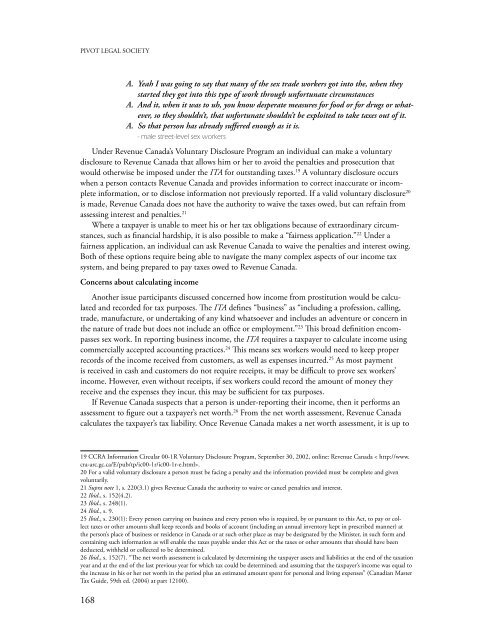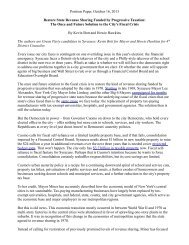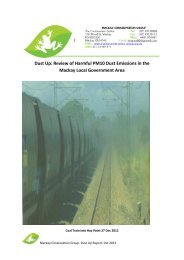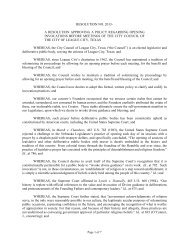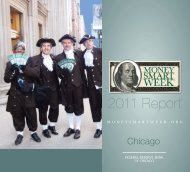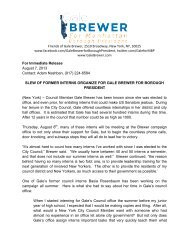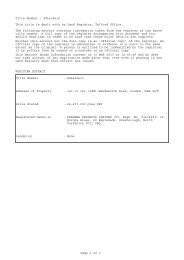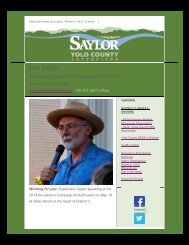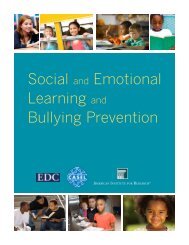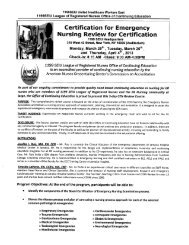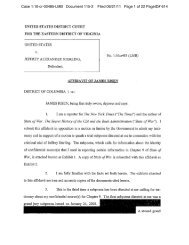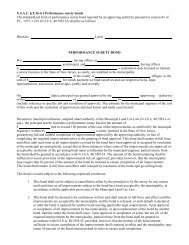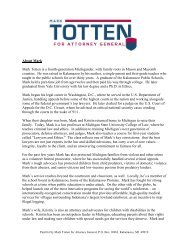PIVOT LEGAL SOCIETYA. Yeah I was going to say that many of the sex trade <strong>work</strong>ers got into the, when theystarted they got into this type of <strong>work</strong> through unfortunate circumstancesA. And it, when it was to uh, you know desperate measures for food or for drugs or whatever,so they shouldn’t, that unfortunate shouldn’t be exploited to take taxes out of it.A. So that person has already suffered enough as it is.- male street-level sex <strong>work</strong>ersUnder Revenue Canada’s Voluntary Disclosure Program an individual can make a voluntarydisclosure to Revenue Canada that allows him or her to avoid the penalties <strong>and</strong> prosecution thatwould otherwise be imposed under the ITA for outst<strong>and</strong>ing taxes. 19 A voluntary disclosure occurswhen a person contacts Revenue Canada <strong>and</strong> provides information to correct inaccurate or incompleteinformation, or to disclose information not previously reported. If a valid voluntary disclosure 20is made, Revenue Canada does not have the authority to waive the taxes owed, but can refrain fromassessing interest <strong>and</strong> penalties. 21Where a taxpayer is unable to meet his or her tax obligations because of extraordinary circumstances,such as financial hardship, it is also possible to make a “fairness application.” 22 Under afairness application, an individual can ask Revenue Canada to waive the penalties <strong>and</strong> interest owing.Both of these options require being able to navigate the many complex aspects of our income taxsystem, <strong>and</strong> being prepared to pay taxes owed to Revenue Canada.Concerns about calculating incomeAnother issue participants discussed concerned how income from prostitution would be calculated<strong>and</strong> recorded for tax purposes. The ITA defines “business” as “including a profession, calling,trade, manufacture, or undertaking of any kind whatsoever <strong>and</strong> includes an adventure or concern inthe nature of trade but does not include an office or employment.” 23 This broad definition encompassessex <strong>work</strong>. In reporting business income, the ITA requires a taxpayer to calculate income usingcommercially accepted accounting practices. 24 This means sex <strong>work</strong>ers would need to keep properrecords of the income received from customers, as well as expenses incurred. 25 As most paymentis received in cash <strong>and</strong> customers do not require receipts, it may be difficult to prove sex <strong>work</strong>ers’income. However, even without receipts, if sex <strong>work</strong>ers could record the amount of money theyreceive <strong>and</strong> the expenses they incur, this may be sufficient for tax purposes.If Revenue Canada suspects that a person is under-reporting their income, then it performs anassessment to figure out a taxpayer’s net worth. 26 From the net worth assessment, Revenue Canadacalculates the taxpayer’s tax liability. Once Revenue Canada makes a net worth assessment, it is up to19 CCRA Information Circular 00-1R Voluntary Disclosure Program, September 30, 2002, online: Revenue Canada < http://www.cra-arc.gc.ca/E/pub/tp/ic00-1r/ic00-1r-e.html>.20 For a valid voluntary disclosure a person must be facing a penalty <strong>and</strong> the information provided must be complete <strong>and</strong> givenvoluntarily.21 Supra note 1, s. 220(3.1) gives Revenue Canada the authority to waive or cancel penalties <strong>and</strong> interest.22 Ibid., s. 152(4.2).23 Ibid., s. 248(1).24 Ibid., s. 9.25 Ibid., s. 230(1): Every person carrying on business <strong>and</strong> every person who is required, by or pursuant to this Act, to pay or collecttaxes or other amounts shall keep records <strong>and</strong> books of account (including an annual inventory kept in prescribed manner) atthe person’s place of business or residence in Canada or at such other place as may be designated by the Minister, in such form <strong>and</strong>containing such information as will enable the taxes payable under this Act or the taxes or other amounts that should have beendeducted, withheld or collected to be determined.26 Ibid., s. 152(7). “The net worth assessment is calculated by determining the taxpayer assets <strong>and</strong> liabilities at the end of the taxationyear <strong>and</strong> at the end of the last previous year for which tax could be determined; <strong>and</strong> assuming that the taxpayer’s income was equal tothe increase in his or her net worth in the period plus an estimated amount spent for personal <strong>and</strong> living expenses” (Canadian MasterTax Guide, 59th ed. (2004) at part 12100).168
BEYOND DECRIMINALIZATION: <strong>Sex</strong> Work, <strong>Human</strong> <strong>Rights</strong> <strong>and</strong> a <strong>New</strong> Frame<strong>work</strong> for Law Reformthe taxpayer to prove Revenue Canada wrong if they believe its assessment is inaccurate. 27 Thereforesex <strong>work</strong>ers should keep a record of each transaction in order to be able to challenge RevenueCanada’s net worth assessment should such a need arise.Some participants felt that sex <strong>work</strong>ers would not accurately report their income or would choosenot to report it. As one sex <strong>work</strong>er stated:A. As soon as you would legalize prostitution, there’s a black market for it. As soon asyou say, like, oh say its okay, there’s an underground market. Because I don’t knowany ho’s that would like to <strong>work</strong> – “oh this is what I made tonight” to the governmentor anything like that, right? So then it is going to create a black market, first of all.- male street-level sex <strong>work</strong>erSome participants noted that sex <strong>work</strong>ers declaring income do not report their full income becausecustomers rarely ask for receipts for the sexual services they pay for. As one massage-parlour ownercommented:A. And of course you are in the same situation with taxes. I mean, yes, they pay theirtaxes. Yeah, on the people that want receipts. No one wants receipts from us. Theydon’t, strangely enough. Two a year, maybe. Can I get a receipt please? Sure, whatwould you like me to put on that?- female massage parlour owner, former sex <strong>work</strong>erParticipants felt that income was easier to calculate for sex <strong>work</strong>ers who <strong>work</strong> in an organized environment.These sex <strong>work</strong>ers may have the resources to consult an accountant. As one explained:A. . . . a lot of escorts do pay their taxes. And interestingly enough, the ones that I knowthat pay their taxes most consistently originally <strong>work</strong>ed for agencies. And their agencyowners were the ones that insisted that they go to their accountants <strong>and</strong>, <strong>and</strong>, do theirtaxes. And of course the reason being is that they didn’t want anything coming backto them, the agency owners [laughs] so, so, most escorts anyway, or a large number ofthem do pay their taxes. The few that don’t, they really live h<strong>and</strong> to mouth.- female off-street out-call sex <strong>work</strong>erUnder the ITA tips count as fully taxable income. For an employee, all tips or benefits, such as giftsreceived in the course of employment, must be included in employment income. 28 Self-employed sex<strong>work</strong>ers must declare tips as business income. 29 <strong>Sex</strong> <strong>work</strong>ers noted the importance of tips in earningtheir living <strong>and</strong> the difficulty of proving this type of income:A. I am sorry to say, on the street with all the girls, it was. No matter what you do, youare in a negotiation with a guy, you don’t get enough money, you get some moneyback in tips <strong>and</strong> it should not be taxed.A. And so you get more money back, on your tips, than the guy could ever give you in agiven date.- female street-level sex <strong>work</strong>ersA. I don’t mind the income tax thing, but when you get tipped out, . . . like, when yougo see a client, your initial amount agreed on is, like, $200. Well, then, any other up27 Dezura v. Minister of National Revenue (1947) 3 D.T.C. 1101 (Exchequer Court of Canada).28 Supra note 1, s. 5: “a taxpayer’s income for a taxation year from an office or employment is the salary, wages <strong>and</strong> other remuneration,including gratuities, received by the taxpayer in the year.” Ibid., s. 6: There should be included in employment income “thevalue of board, lodging <strong>and</strong> other benefits of any kind whatever received or enjoyed by the taxpayer in the year in respect of, in thecourse of, or by virtue of an office or employment.”29 Ibid., s. 9.169
- Page 4:
PIVOT LEGAL SOCIETYPart 2: Municipa
- Page 21 and 22:
BEYOND DECRIMINALIZATION: Sex Work,
- Page 23 and 24:
BEYOND DECRIMINALIZATION: Sex Work,
- Page 25 and 26:
BEYOND DECRIMINALIZATION: Sex Work,
- Page 27 and 28:
BEYOND DECRIMINALIZATION: Sex Work,
- Page 29 and 30:
BEYOND DECRIMINALIZATION: Sex Work,
- Page 31 and 32:
BEYOND DECRIMINALIZATION: Sex Work,
- Page 33 and 34:
BEYOND DECRIMINALIZATION: Sex Work,
- Page 35 and 36:
BEYOND DECRIMINALIZATION: Sex Work,
- Page 37 and 38:
BEYOND DECRIMINALIZATION: Sex Work,
- Page 39 and 40:
BEYOND DECRIMINALIZATION: Sex Work,
- Page 41 and 42:
BEYOND DECRIMINALIZATION: Sex Work,
- Page 43 and 44:
BEYOND DECRIMINALIZATION: Sex Work,
- Page 45 and 46:
BEYOND DECRIMINALIZATION: Sex Work,
- Page 47 and 48:
BEYOND DECRIMINALIZATION: Sex Work,
- Page 49 and 50:
BEYOND DECRIMINALIZATION: Sex Work,
- Page 51 and 52:
BEYOND DECRIMINALIZATION: Sex Work,
- Page 53 and 54:
BEYOND DECRIMINALIZATION: Sex Work,
- Page 55 and 56:
BEYOND DECRIMINALIZATION: Sex Work,
- Page 57 and 58:
BEYOND DECRIMINALIZATION: Sex Work,
- Page 59 and 60:
BEYOND DECRIMINALIZATION: Sex Work,
- Page 61 and 62:
BEYOND DECRIMINALIZATION: Sex Work,
- Page 63 and 64:
BEYOND DECRIMINALIZATION: Sex Work,
- Page 65 and 66:
BEYOND DECRIMINALIZATION: Sex Work,
- Page 67 and 68:
BEYOND DECRIMINALIZATION: Sex Work,
- Page 69 and 70:
BEYOND DECRIMINALIZATION: Sex Work,
- Page 71 and 72:
BEYOND DECRIMINALIZATION: Sex Work,
- Page 73 and 74:
BEYOND DECRIMINALIZATION: Sex Work,
- Page 75 and 76:
BEYOND DECRIMINALIZATION: Sex Work,
- Page 77 and 78:
BEYOND DECRIMINALIZATION: Sex Work,
- Page 79 and 80:
BEYOND DECRIMINALIZATION: Sex Work,
- Page 81 and 82:
BEYOND DECRIMINALIZATION: Sex Work,
- Page 83 and 84:
BEYOND DECRIMINALIZATION: Sex Work,
- Page 85 and 86:
BEYOND DECRIMINALIZATION: Sex Work,
- Page 87 and 88:
BEYOND DECRIMINALIZATION: Sex Work,
- Page 89 and 90:
BEYOND DECRIMINALIZATION: Sex Work,
- Page 91 and 92:
BEYOND DECRIMINALIZATION: Sex Work,
- Page 93 and 94:
BEYOND DECRIMINALIZATION: Sex Work,
- Page 95 and 96:
BEYOND DECRIMINALIZATION: Sex Work,
- Page 97 and 98:
BEYOND DECRIMINALIZATION: Sex Work,
- Page 99 and 100:
BEYOND DECRIMINALIZATION: Sex Work,
- Page 101 and 102:
BEYOND DECRIMINALIZATION: Sex Work,
- Page 103 and 104:
BEYOND DECRIMINALIZATION: Sex Work,
- Page 105 and 106:
BEYOND DECRIMINALIZATION: Sex Work,
- Page 107 and 108:
BEYOND DECRIMINALIZATION: Sex Work,
- Page 109 and 110:
BEYOND DECRIMINALIZATION: Sex Work,
- Page 111 and 112:
BEYOND DECRIMINALIZATION: Sex Work,
- Page 113 and 114:
BEYOND DECRIMINALIZATION: Sex Work,
- Page 115 and 116:
BEYOND DECRIMINALIZATION: Sex Work,
- Page 117 and 118: BEYOND DECRIMINALIZATION: Sex Work,
- Page 119 and 120: BEYOND DECRIMINALIZATION: Sex Work,
- Page 121 and 122: BEYOND DECRIMINALIZATION: Sex Work,
- Page 123 and 124: BEYOND DECRIMINALIZATION: Sex Work,
- Page 125 and 126: BEYOND DECRIMINALIZATION: Sex Work,
- Page 127 and 128: BEYOND DECRIMINALIZATION: Sex Work,
- Page 129 and 130: BEYOND DECRIMINALIZATION: Sex Work,
- Page 131 and 132: BEYOND DECRIMINALIZATION: Sex Work,
- Page 133 and 134: BEYOND DECRIMINALIZATION: Sex Work,
- Page 135 and 136: BEYOND DECRIMINALIZATION: Sex Work,
- Page 137 and 138: BEYOND DECRIMINALIZATION: Sex Work,
- Page 139 and 140: BEYOND DECRIMINALIZATION: Sex Work,
- Page 141 and 142: BEYOND DECRIMINALIZATION: Sex Work,
- Page 143 and 144: BEYOND DECRIMINALIZATION: Sex Work,
- Page 145 and 146: BEYOND DECRIMINALIZATION: Sex Work,
- Page 147 and 148: BEYOND DECRIMINALIZATION: Sex Work,
- Page 149 and 150: BEYOND DECRIMINALIZATION: Sex Work,
- Page 151 and 152: BEYOND DECRIMINALIZATION: Sex Work,
- Page 153 and 154: BEYOND DECRIMINALIZATION: Sex Work,
- Page 155 and 156: BEYOND DECRIMINALIZATION: Sex Work,
- Page 157 and 158: BEYOND DECRIMINALIZATION: Sex Work,
- Page 159 and 160: BEYOND DECRIMINALIZATION: Sex Work,
- Page 161 and 162: BEYOND DECRIMINALIZATION: Sex Work,
- Page 163 and 164: BEYOND DECRIMINALIZATION: Sex Work,
- Page 165 and 166: BEYOND DECRIMINALIZATION: Sex Work,
- Page 167: BEYOND DECRIMINALIZATION: Sex Work,
- Page 171 and 172: BEYOND DECRIMINALIZATION: Sex Work,
- Page 173 and 174: BEYOND DECRIMINALIZATION: Sex Work,
- Page 175 and 176: BEYOND DECRIMINALIZATION: Sex Work,
- Page 177 and 178: BEYOND DECRIMINALIZATION: Sex Work,
- Page 179 and 180: BEYOND DECRIMINALIZATION: Sex Work,
- Page 181 and 182: BEYOND DECRIMINALIZATION: Sex Work,
- Page 183 and 184: BEYOND DECRIMINALIZATION: Sex Work,
- Page 185 and 186: BEYOND DECRIMINALIZATION: Sex Work,
- Page 187 and 188: BEYOND DECRIMINALIZATION: Sex Work,
- Page 189 and 190: BEYOND DECRIMINALIZATION: Sex Work,
- Page 191 and 192: BEYOND DECRIMINALIZATION: Sex Work,
- Page 193 and 194: BEYOND DECRIMINALIZATION: Sex Work,
- Page 195 and 196: BEYOND DECRIMINALIZATION: Sex Work,
- Page 197 and 198: BEYOND DECRIMINALIZATION: Sex Work,
- Page 199 and 200: BEYOND DECRIMINALIZATION: Sex Work,
- Page 201 and 202: BEYOND DECRIMINALIZATION: Sex Work,
- Page 203 and 204: BEYOND DECRIMINALIZATION: Sex Work,
- Page 205 and 206: BEYOND DECRIMINALIZATION: Sex Work,
- Page 207 and 208: BEYOND DECRIMINALIZATION: Sex Work,
- Page 209 and 210: BEYOND DECRIMINALIZATION: Sex Work,
- Page 211 and 212: BEYOND DECRIMINALIZATION: Sex Work,
- Page 213 and 214: BEYOND DECRIMINALIZATION: Sex Work,
- Page 215 and 216: BEYOND DECRIMINALIZATION: Sex Work,
- Page 217 and 218: BEYOND DECRIMINALIZATION: Sex Work,
- Page 219 and 220:
BEYOND DECRIMINALIZATION: Sex Work,
- Page 221 and 222:
BEYOND DECRIMINALIZATION: Sex Work,
- Page 223 and 224:
BEYOND DECRIMINALIZATION: Sex Work,
- Page 225 and 226:
BEYOND DECRIMINALIZATION: Sex Work,
- Page 227 and 228:
BEYOND DECRIMINALIZATION: Sex Work,
- Page 229:
BEYOND DECRIMINALIZATION: Sex Work,


